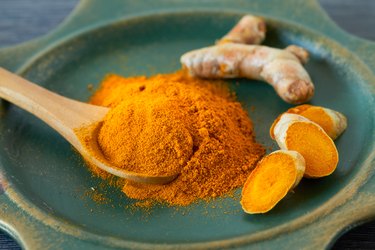
If you have blocked sinuses, a sinus infection or chronic sinusitis and you've heard of turmeric's sinus-unclogging potential, you may be ready to mix up a bright yellow elixir so you can feel better ASAP. But hold on: Does the spice really unblock your sinuses? In short: Maybe.
Video of the Day
Video of the Day
The Medicinal Power of Turmeric
Derived from a plant belonging to the ginger family, turmeric is a Southeast Asian staple and a major ingredient in curry, according to the National Center for Complementary and Integrative Health (NCCIH).
And this colorful yellow spice has indeed been touted for a variety of health benefits, per the Mayo Clinic, which suggests it's the curcumin (turmeric's active ingredient and the source of its yellow color) that's linked to benefits for type 2 diabetes, inflammatory bowel disease, obesity and cancer.
Turmeric is also a staple of Chinese and Indian traditional medicine, according to the NCCIH, and it's used by the latter to treat skin conditions, joint problems, gastrointestinal concerns and, yes, upper respiratory tract disorders.
As a dietary supplement, turmeric has been lauded for myriad conditions including arthritis, allergies, GI disorders, liver disease, depression and, yet again, respiratory infections, among other things, per the NCCIH.
Turmeric May Not Clear Sinuses
But is turmeric's sinus-unclogging promise certain? As it stands, expert takes largely range from "maybe" to "no one really knows."
Absent any randomized controlled trials, "the answer is possibly," given lab work highlighting its anti-inflammatory capacity, says Lona Sandon, PhD, RDN, a Dallas-based registered dietitian nutritionist and associate professor in the Department of Clinical Nutrition at the University of Texas Southwestern Medical Center.
Still, turmeric is "not an antibiotic designed to treat the infection that is likely the cause of sinusitis," Sandon says. "So it may help alleviate symptoms to some degree, but not kill off the offending pathogen that is causing the sinusitis."
Doug Cook, RDN, MPH, a registered dietitian nutritionist at the Centre for Addiction and Mental Health, Toronto, Ontario, Canada, is less convinced of turmeric as a sinus-clearing solution.
For one thing, Cook says, "turmeric as a spice is poorly absorbed" — a thought echoed by the NCCIH, which notes that curcumin has low bioavailability, meaning most of what you might take in will never reach the bloodstream.
The other problem, the NCCIH adds, is that curcumin is an unstable ingredient, making it hard to study. And beyond the research concerns, the NCCIH notes that turmeric's purported health benefits remain unproven.
Cook agrees. His take on turmeric's sinusitis relief power is simply: "There is no evidence I'm aware of," he says.
Could Curcuminoids Lessen Sinus Inflammation?
But zeroing in on turmeric's curcuminoid composition lends a potentially more optimistic take for the power of the yellow spice to loosen up your sinuses.
Mayo Clinic underscores the natural anti-inflammatory property of curcuminoids. And the Pacific College of Health and Science (PCHS) notes that as inflammation is an important aspect of sinus trouble, eating foods that can inhibit inflammation may help.
Among those foods — you guessed it — is turmeric, according to the PCHS.
Given its stance that nutrition can play a healing role when facing sinus problems, beyond turmeric, the PCHS recommends anti-inflammatory diet that includes:
How to Use Turmeric
Turmeric has no real downside, so if you do decide to add the yellow spice to your diet for potential sinus or other health benefits, enjoy up to a maximum of 8 grams per day as a powder or as part of a curry or chutney sauce, according to the Mayo Clinic.
Direct nasal applications are not safe, Sandon says. "The aroma of many spices can give the sensation of opening up the nasal passages, as some spices can cause dilation of vessels, but I would caution people not to inhale it," she says. "Inhaling could lead to a burning sensation and damage to membranes in the nose and sinus or even the lungs."
- Lona Sandon, PhD, RDN, LD, registered dietitian nutritionist; associate professor, Department of Clinical Nutrition, University of Texas Southwestern Medical Center, Dallas
- Doug Cook, RDN, MPH, registered dietitian nutritionist, Centre for Addiction and Mental Health, Toronto, Ontario, Canada
- National Center for Complementary and Integrative Health: “Turmeric”
- Mayo Clinic: “Home Remedies: Are There Health Benefits of Turmeric?”
- Pacific College of Health and Science: “Improve Your Sinuses Today: What To Eat To Avoid Inflammation”
Is this an emergency? If you are experiencing serious medical symptoms, please see the National Library of Medicine’s list of signs you need emergency medical attention or call 911.